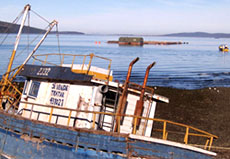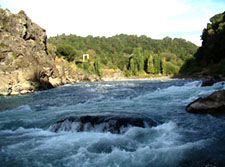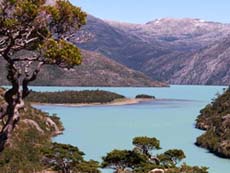
Hanging on For Survival in Chiloé: Ground Zero in Chile’s Salmon Bust
Quellón, Chile - In the dwindling light of a crisp autumn evening, snow-covered Corcovado and its sister peaks shine pink above the silhouetted fishing boats that stretch out beyond the harbor in Quellón. The alpine glow is short-lived, though, and as the sun drops below the horizon. "The city is full of people just walking around," said Juana Chiguay, a union leader and assembly line worker in a local salmon processing plant. "Before it wasn't like that."



